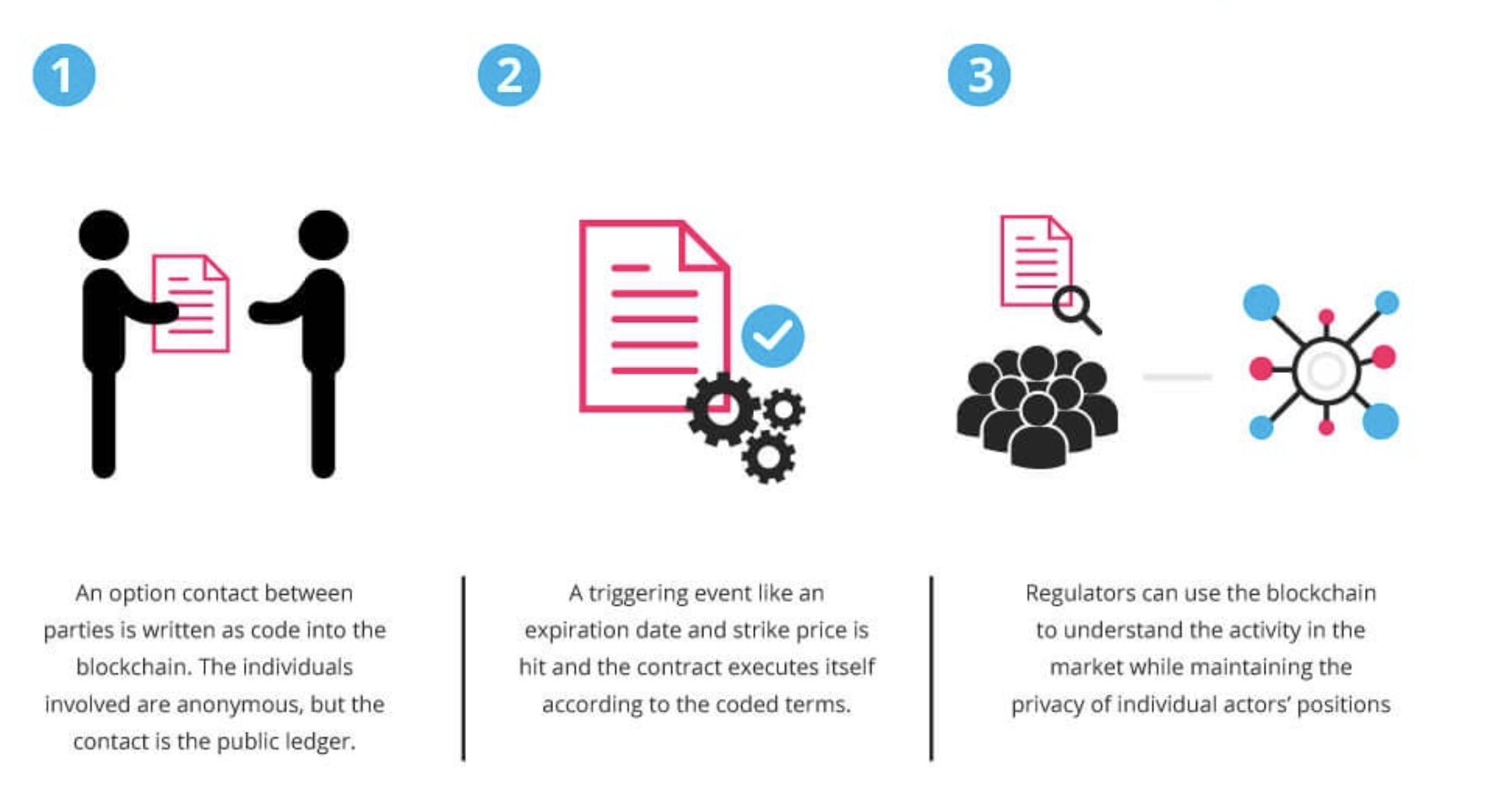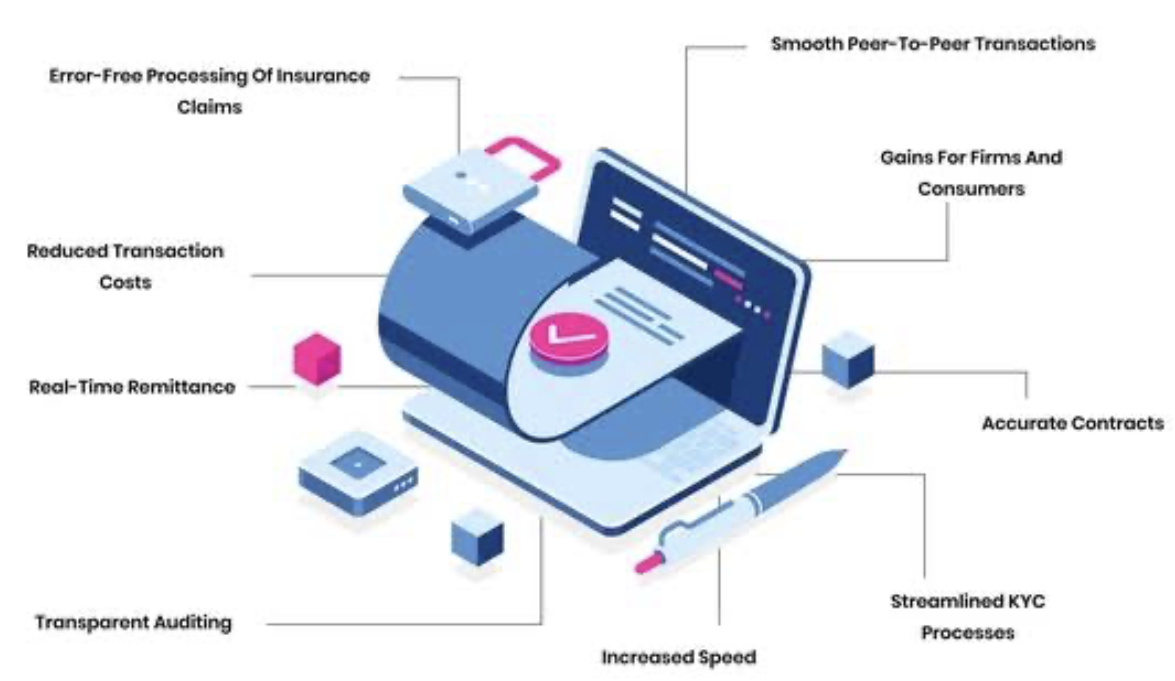Smart contracts are contracts between parties that are executed by programming codes. These programming codes are stored on a blockchain and can be triggered when the pre-set conditions or terms of contracts are fulfilled.
A simpler way to explain this is to say that smart contracts are contracts that get completed by automation with the help of codes. The execution of these codes happens as soon as the pre-set terms of contracts are met. Thus, there is no need for a third party to execute a smart contract, as the contract workflow can be automated and stored in a blockchain, waiting for a trigger to call its execution.
For example, smart contracts can be used to process royalty payments for independent creators without the need for intermediaries to decide how much royalty a creator should be paid. It can also be used to streamline and strengthen B2C relationships in real-time and KYC processes or other verifications.
Since the code of a smart contract is stored on a blockchain-based platform, it benefits from the advantages of a blockchain. As such, it gets the security, immutability, and permanence characteristics that blockchain technology offers.
What Are The Benefits Of Using Smart Contracts?
Listed below are the core benefits of using smart contracts:
Autonomy: Smart contracts are automated with the help of codes. They do not need third-party intermediaries to execute the contract. This offers quick and transparent transactions between the parties to a contract and establishes a direct connection between them.
Security: The codes of a smart contract are stored in a blockchain. Therefore, it is not possible to easily amend the codes or terms of the contract. Any violation of the code will be detected by the blockchain network and will be marked invalid. Thus, smart contracts provide more security by actively detecting any contract breach.
Low-cost: Since smart contracts get executed without any middlemen such as lawyers, brokers, and third-party witnesses, they complete transactions at a lower cost than traditional contracts. Thus, it helps to keep operational costs low. Smart contracts are executed in the nodes of blockchain technology, meaning it does notrequire any paperwork, which again saves money and resources.
Documentation: Smart contract codes are stored in blockchain technology in chronological order. And since blockchain is a shared ledger, the terms of the smart contracts get replicated in each node of the network. This allows easy access to audits and compliance checks. In addition to this, confidential details about the parties can be masked cryptographically to uphold full privacy.
Immutable: By leveraging the capacity of blockchains, smart contracts are immutable. This means that a smart contract cannot be broken or amended. Thus, one party cannot engage in foul play once the terms of the contract are satisfied. This allows for enhanced trust in smart contracts.
How Smart Contracts Are Different From Traditional Contracts?
The primary purpose of a smart contract and a traditional contract is the same. It is to execute an agreement, in part or in full, between two parties. However, the two carry out this function in a different way.
A smart contract is a self-executing contract and can be automated by storing a program code on blockchain technology. Whereas, a traditional contract is normally laid out in written form on a document and needs a third party, such as a lawyer, to execute it.
In the below table, we have listed the basic difference between smart contracts and traditional contracts:
| Traditional Contracts | Smart Contracts |
| Traditional contracts are legally binding in nature and, therefore, enforceable by law. | Smart contracts may not necessarily be legally binding and, therefore, self-enforceable in nature. |
| Needs third parties, such as the court, lawyers, witnesses, etc to execute and enforce it. | Smart contracts are designed to be automated. The code gets executed only when the terms of the contract are met. |
| It can be made valid only by both parties agreeing to it and signing to that effect. | Since smart contracts are stored in blockchain networks, they can be validated by anyone. |
| Prone to a data breach, theft, or manipulation. | Less prone to a data breach, theft, or manipulation as it is stored on the blockchain. |
| Activities of a traditional contract are difficult to trace. | The activities of a smart contract are traceable and irreversible. |
| Manual and prone to errors. | Computer-operated and thus less prone to errors. |
| It can be modified and amended if the need arises. | Once the smart contract is stored, it is difficult to change or modify it. |
| Records are stored physically and not made available to the public. | Records are stored on a blockchain and accessible to the public. |
| More expensive since it goes through a process. | Low cost because it is fast and let go of intermediaries. |
Origin of Smart Contracts
The term “smart contracts” was coined about 25 years ago by Nick Szabo. He is a cryptographer and computer scientist by profession who predicted the possible use of smart contracts long before blockchain technology was created.
According to Szabo, smart contracts are called “smart” because they excel in their functionality as compared to paper-based traditional contracts. In his paper, he described smart contracts as a “set of promises, specified in digital form, including protocols within which the parties perform on these promises.”
Szabo gave the example of a vending machine while explaining smart contracts. According to him, smart contracts are designed to work like a vending machine. Don’t forget that the vending machine also helps to complete a contract between two parties without any intermediary. For instance, when a customer pays the money to purchase a snack, the vending machine releases the snack to “honour the terms of the unwritten agreement.”
How Do Smart Contracts Operate?
Smart contracts are computer codes that are stored in blockchain technology, waiting to be executed as soon as the conditions of the contract are fulfilled. These codes can be written in programming languages such as Web Assembly and Solidity.
Since every code of the smart contract is stored on the blockchain, it is accessible to the public. Thus, anyone who is interested can see and read the code. The main working model of smart contracts is based on simple conditions – “if….then” and “when…then” that are written into the code. This essentially means that if a certain condition is satisfied, then the contract will get executed.
For instance, let us say that if a person buys cryptocurrency, then he gets a discount coupon for his next payment. So, now when someone initiates a transaction to purchase crypto, the smart contracts will receive the funds, which will trigger its code to get executed by all the nodes of the blockchain network, and they reach a consensus on the outcome. The outcome is to send the user the discount coupon that could be used for the next purchase.
Once the transaction is completed, it cannot be reversed, and the ledger in the blockchain will get updated with the recent activity of the smart contract. Thus, every activity of a smart contract is traceable since everything is chronologically recorded in the nodes.
This is also why smart contracts are immutable. Meaning once the code is deployed, it cannot be altered or changed, and the transaction will get completed whenever the pre-set conditions are met. There are, however, exceptions to this rule.
Challenges Faced By Smart Contracts
Smart contracts have proven to be the best technique to solve some inherent gaps that are too complex when handled manually. However, at the same time, we must acknowledge the fact that smart contracts also have their limitations.
Here are some of the challenges faced by smart contracts:
- Immutability: Since smart contracts are stored on a blockchain, they are immutable. This means that they cannot be easily modified or changed if the need arises. It can cause a lot of problems to correct if some genuine mistakes crop up in the code. This can also be considered as an advantage.
- Scalability: As the adoption of smart contracts continues to grow, scalability becomes a major concern. Smart contracts face this issue due to the limited throughput and high transaction costs of blockchain networks. As the number of transactions grows, this limitation becomes more obvious, thereby hindering the efficiency of smart contracts.
- Security: Smart contracts may be secure but not without some threats. If a smart contract code is poorly written or not maintained properly, then the network may get prone to attacks or other manipulations, thus causing great complications to the entire contract.
- Sustainability: It is not a secret that blockchain technologies are not sustainable. They have a huge carbon footprint because they use more computational resources. Thus, the use of smart contracts attracts a huge environmental cost. That said, you might be pleased to know that there are some eco-friendly cryptocurrencies with fewer computational resources.
But, before delving into any of these assets, we recommend that you read our guide on how to buy cryptocurrency safely in 2024.
Blockchain Platforms That Support Smart Contracts
Despite the inherent challenges of smart contracts, many blockchain technologies support smart contracts. Some of them are:
| Ethereum | Implements a Turing-complete language on its blockchain, a prominent smart contract framework. It uses Proof-of-Stake consensus mechanism. |
| Tezos | A blockchain platform using a consensus mechanism called Liquid Proof-of-Stake (LPoS) to agree on valid transactions in the Tezos network |
| Avalanche | A blockchain platform for smart contracts, using Snow consensus protocol |
| Solana | A blockchain platform for smart contracts, using Proof-of-history consensus mechanism, |
| Tron | A blockchain platform for smart contracts, using a delegated Proof-of-Stake (DPoS) consensus mechanism |
| EOS.IO | A blockchain platform for smart contracts, using a delegated Proof-of-Stake |
| Cardano | A blockchain platform for smart contracts, using Proof-of-Stake consensus mechanism |
Applications Of Smart Contracts
The application of smart contracts is not limited to the crypto world alone. In recent years, several industries have adopted the technology as a potent tool for enhanced authentication and sharing of records. In this session, we present some of the areas in which smart contracts are being applied:
Banking
Smart contracts are already changing the landscape of the banking sector. From processing peer-to-peer transactions, and managing KYC processes, to executing error-free insurance claims, smart contracts are behind everything.
Healthcare
Smart contracts will also find immense opportunities in the healthcare sector. From processing bills to verifying insurance claims to keeping crucial patient records, everything can be done more efficiently by deploying codes in smart contracts.
Transfer Of Ownership
Be it real estate or vehicles, with smart contracts, transfer of ownership can be done without the need for a middleman. This will make the process cost and time effective. Smart contracts can also keep tabs on any upcoming maintenance or insurance payment and can send reminders to the owners to get it done. This method is currently most prominent in transferring the ownership of NFTs. Check out our guide to discover how you can buy NFTs safely.
Publishing Industry
The publishing industry can record the ownership and rights of a book in a blockchain network. Then a smart contract can be used to calculate and pay royalties which will automatically get credited to the owner whenever the book is sold.
Smart contracts can also be used to keep track of copyright ownership and thus settle any related disputes more quickly and efficiently without the need for a lawyer.
Conclusion
The development of smart contracts is remarkable. With its automation technology and efficiency, it can help resolve many challenges that industries face today. Smart contracts can help businesses focus on their main operations by taking care of mundane tasks with the help of computational code. We will see its true potential as more and more industries adapt to blockchain-based smart contracts.
FAQ
What are Smart Contracts?
Smart Contracts are programs that self-execute when certain conditions are met. In the context of blockchain, these programs are used to facilitate transactions upon the fulfilment of certain conditions.
What are the different types of smart contracts?
There are four types of smart contracts: proxy contracts, verification contracts, business contracts, and storage contracts.
Can smart contracts be changed?
Once a smart contract is integrated into a blockchain, it cannot be altered. However, a decentralization application can be designed to allow two smart contracts to operate together, with one acting as a backend for another.






